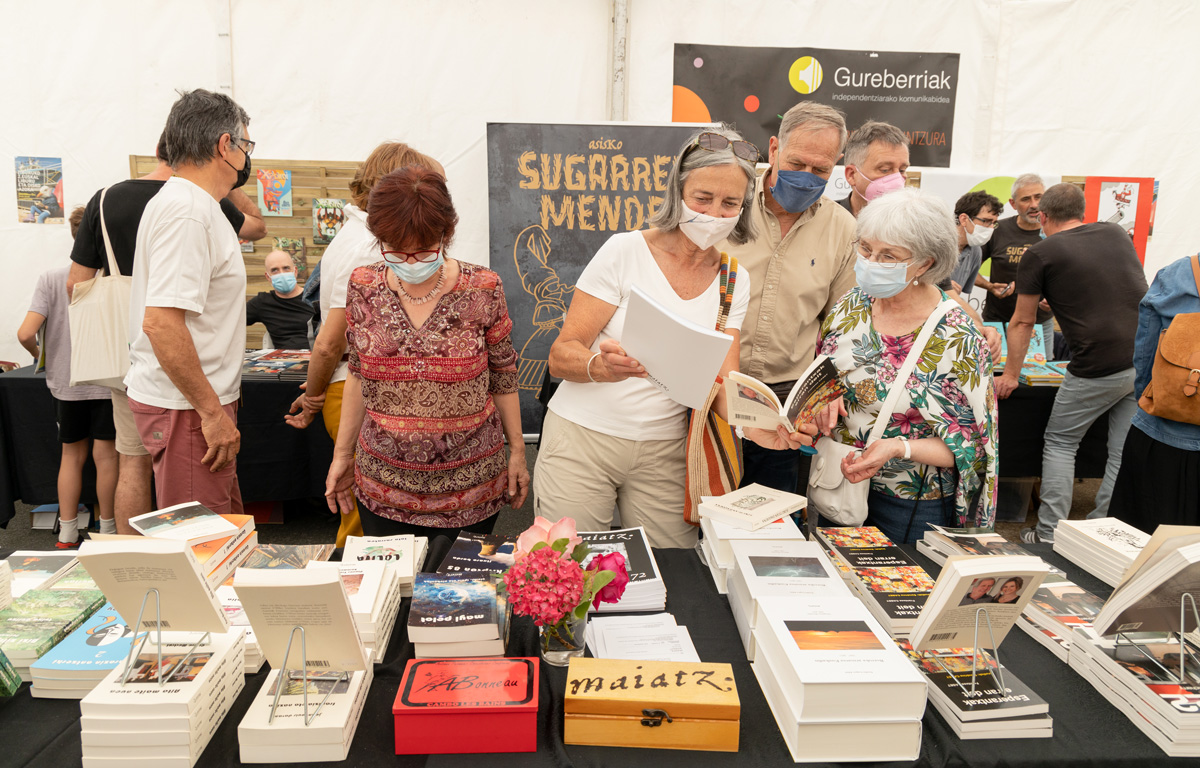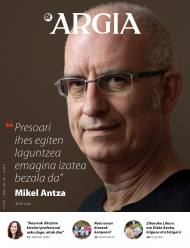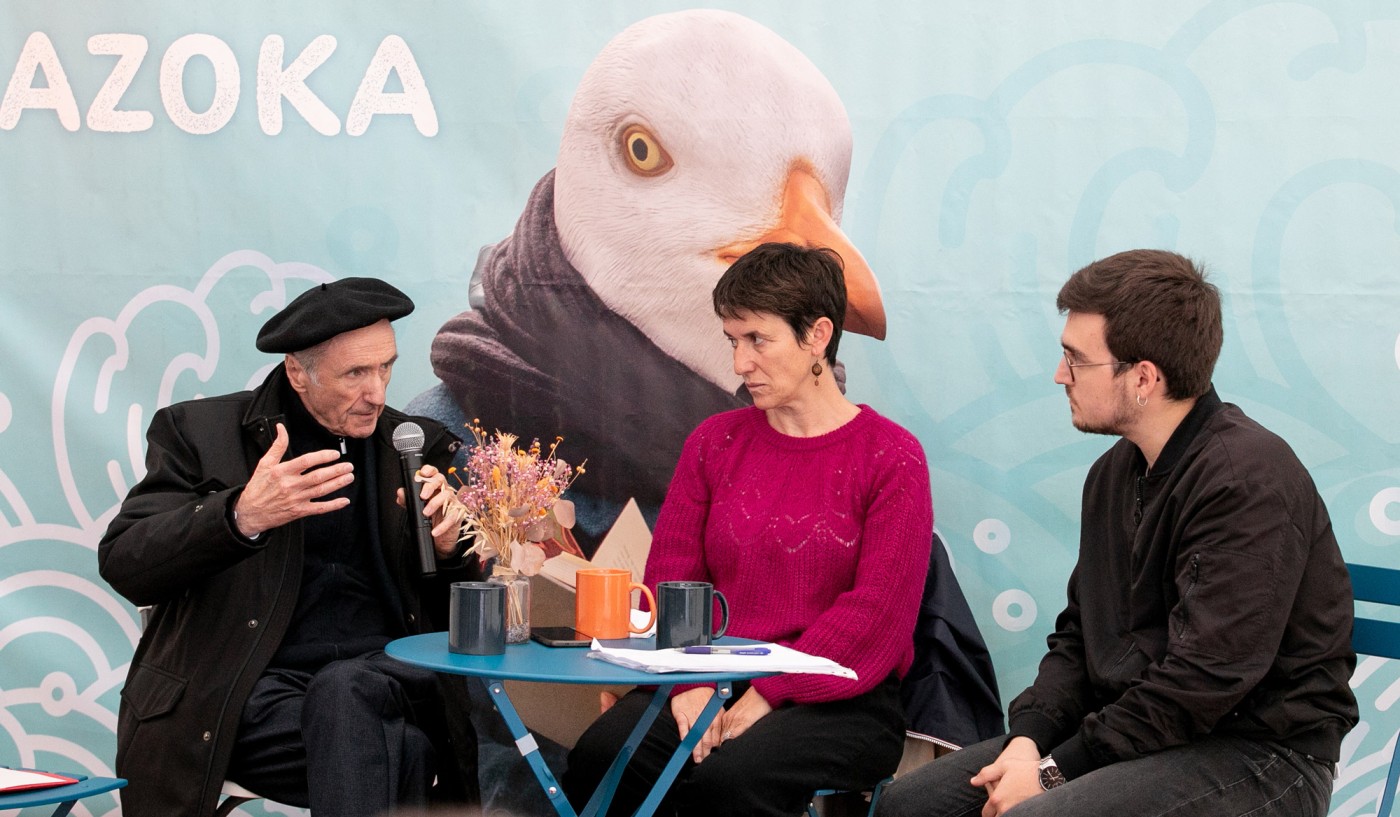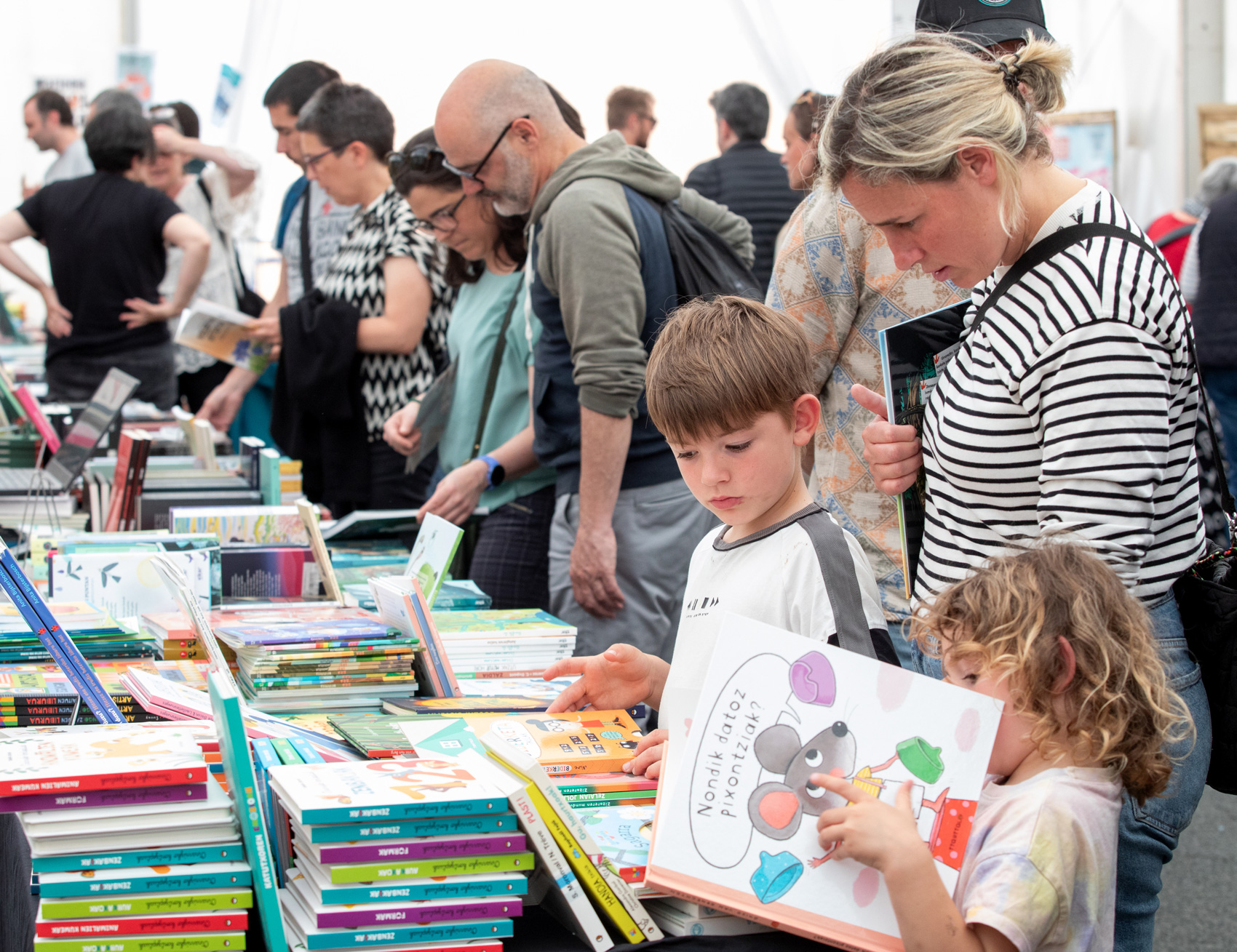The ideal formula to affirm that our ttipia is large
- The second edition of the Feria del Libro y Disco Vasco, organized jointly by the Ziburutarra Baltsan Association and ARGIA, was very well spent on 12 June in Ziburu. Both the readers, the writers and the members of the editorials have been satisfied and the organizers have made a “very good” valuation, which has not been possible to repeat in the future. They have fulfilled the objective of living the square in Euskera and in Euskera, and in the background, proposing an appointment in Euskera on the coast of Lapurdi is something... important.

People came hungry and came home satisfied. The Book Fair and the Basque Album of Ziburu has been known to be a good book, Euskara gose and hungry people. For the second time, the fair organized jointly by the association Ziburutarra Baltsan and Argia has passed through the coastal village of Lapurdi in the twelfth month of June. Lezo, Azpeitia, Izpura, Oiartzun, Zarautz, Azkarate, Baiona, Pamplona, Orio, Urruña, Hendaia, Ozta, Hernani, Astigarraga... People from different parts of Euskal Herria have come, as the writer of the editorial Luzien Etxezaharreta Mayo says, “because Ziburu is a good place to make the union of those from both sides.”
There were 23 publishers, publishing books written in Basque, the largest of the ttipis and the most ttips of the ttips, which did not shadow fusion. Because the big ones warn us that ours is ttip and we repeat that we are ttipi as well. And, of course, there are ttipis (next to the big ones), but leaving aside the creations written in French and Spanish, and dedicating the whole square to those of Euskera, it is obvious to us that our ttipia is great. This authentication could be done with simplicity and even pride by discovering the menu of Ziburu Square.
Among them was the editorial Pamiela, which was attended by the member Peio Elzaburu with a “special attachment”: “We are a Navarre publisher, although luckily we are not in the situation of Ipar Euskal Herria, we have also had bad times and passed them, so we always respond affirmatively to all the gummies of Iparralde. We are aware of the importance of the community, we are minority and we know how important the meeting point is, we understand the Navarros perfectly”.
It has been a meeting point, and the typicity of the fair has allowed the closeness between writers and readers. Even though the white tent on the plaza has gathered people, there have been no suffocating agglomerations, and there was time and space for conversation. Considering that in Arteta we have the need to remember what is actually going on, Etxezaharreta warns us that: “It’s important for a writer to talk to the reader.” Yes, and the phrase also serves unequivocally: “It’s important for a reader to talk to the writer.” Oihana Arana has been presenting the book of poems Lazunak azkazaletan edited with the editorial Susa. He also likes the exchange: “I like to see something that has spent so much time inside yourself, how it then changes shape, how people live. It changes, what one writes and what the other reads is not the same, because in the end each one reads every book from where he is and from what he lives, and to me the confrontations that occur there seem always interesting to me.”
We have to keep in mind that this exchange is necessary, when we step out of COVID-19 to half a year alone. When talking to different publishers, we have also talked about the influence of this context, and they affirm that, in general, it has not been a violent blow in the editorial production. “Books have followed their path, writing writers, reading readers... that movement has not been cut by the situation, what we have lost is the exchange of writers: greet, congratulate face to face or come together and comment on the book,” says Itziar Ugarte of Susa. The Ziburu Trade Fair was a quote to recover this loss. Of the same opinion is Elzaburu de Pamiela: “If the emotion is great, you notice that this good habit of reading has not been lost, even more people feel hungry.”
In the morning, the hours of the presentation of books and the bertso-drawing session Bozoka, Odei Barroso and Maddi Ane Txoperena were still in the astirio, at ease, on the terrace. “A year ago that I almost did not sing in a plaza… it has fulfilled many functions, among them, having responded to the hunger of people, has offered us a social life, and has influenced me also in the artistic life, has made me feel like singing bertsos in the plaza, I have thanked the presence of the people.” Chopere's follows the same path: “I’ve worked in much more formal taboos and rooms, but I’ve thanked the closeness to the people who have offered today. The meeting was one day, I’ve provoked a lot of people I hadn’t seen long ago.” Two have also thanked that the fair was directed to Basque books and records: “This positive discrimination is positive”; “limiting rigorously is good, because otherwise we are eaten by the other”.
Also on Saturday was a plaza to listen to the explanations about the last books of seven writers, through presentations directed by the journalist Radio Vasca Maia Muruaga: Maddi lives in the interior of Ene de Ane Txoperena, in the century Sugar de Asisco, Naparra de Jon Alonso, open case, the Burmese case of Mikel Antza and Adur Larrea: revolution and live! Plants of the House of Jakoba Errekondo, Lazunak of Oihana Arana on the nails and Susmaestras of Itxaro Borda. In total, the editorials raised about 60 novelties this year, accompanied by another hundreds of years prior to the readers' viewing.
Centrality in editorial production in Euskera
“It is a matter of satisfaction to give visibility and centrality to the editorial production in Euskera,” says Susako Ugarte. The choice of the organizers has been to dedicate the space to editorial production in Basque and channel communication only in Basque. A courageous and political choice, a diglossia in a violent environment, for Ipar Euskal Herria who opts for bilingualism in the introduction of the Basque Country. Brave, political and grateful for those of us who want to live in Basque. More than one filmmaker was delighted to see his place in Euskera.
Although the time of the review is not yet that of the editorial, at the meeting the member of Ladix Arrosagarai Baltsan made “very optimistic” at the end of the day: “Our goal is to support the production of books and we are pleased that there have been more readers who have come to this second edition and that the publishers have also sold more”.
“[Ipar Euskal Herria] is a book shop in which products in Euskera are simple or unavailable. And if they're not spectacular, they don't buy them. Therefore, we want to give visibility and accessibility to production in Euskera”, thought Adur Larrea, member and cartoonist of Baltsan in the presentation of the exhibition of motives.
“The whole square has spoken all day in Basque,” says Arrosagaraik, alai. A great victory for Ziburu, with the Basques around 12%. In the Northern Basque Country, of 310,000 inhabitants, there are 51,000 Vasco-speakers who, without any recognition, live in Euskera as they are done, against the current, from the conscience and the heart.
From school to plaza
Among these, boys and girls are better in terms of typical ages: two out of three boys and girls receive education in Basque, either in their entirety or in their bilingual department. But the problem is that the many have a language that they have heard between the four walls of the school, because both at home and in the plaza they have the French and the language that they have to use.
Concerned about this linguistic situation, even for a single day, they wanted to turn this children's reality with the fair: “That you listen to the Basque in the plaza of your town, together with your parents, with pleasure and without pressure,” says the organizer and writer Maddi Zubeldia, asking about his goal in front of the children. Thus, a few months earlier they contacted the schools and formed the tale of the Old Fountain with historian Bernadette Irazoki and with the help of mandoline Mixel Klaudio, guitarist Txomin Aritzaga and the accordionist Xano Urtxegi.
In the old fountain of the town, built in 1676, each school has brought out a song between the story, in which there was talk of an element of water. “This place has magic. We've drunk from the old source, we've discovered the function of the source, we've seen the importance of acting as storytellers, of partnering. It’s our source, it’s exhausted... but today it didn’t run out,” says Zubeldia, still enchanted by the time she lived. They have not been directly told that the metaphor of the meeting of the Basque Country and the Basque Country could be a source, but without giving a formal explanation they would link to the environment surrounding them. Leaving the tap, they all ended up in the market, both children and parents: “People who were not going to come to the fair thanks to the story of Iturri zaharra and have been taught that they can also enjoy Euskera outside the school,” says Arrosagarai. Zubeldia has a quote from her old source that she wants to repeat every year.
As a quote from the source, the desire to repeat the appointment in the plaza is also on the part of the organization. The journalist has asked Arrosagari about the need to expand the potential of fame in a popular and familiar environment that allowed the small size of the fair. The answer – in a personal way – is that “we can go a couple of measures higher but not much … if not, we should move to a larger space, but in that case we would leave the plaza, and our goal is for the Basque country to occupy the square precisely. Therefore, expand yes, but within the limits given to us by the plaza.” Even if it is a day a year, we will deny that the Plaza de Ziburu will be back to live in Basque.
The fair ended with the concert of Aguxtin Alkhat and Julien Labat. The market gave its doors and there were many that extended throughout the year in the terraces of the bars Maitenia and Bittor of the plaza, in two of the Basque bars that throughout the year are areas appreciated by the Basques.
What place does the theater have in a showcase like the book and the Basque fair of Ziburu? Or in other words, how much does the theater of literature have? This question was the starting point for Daniel Landart and Arantxa Hirioien at the round table Zubiburu of the opening... [+]
Berrogei argitaletxe eta diskoetxe, horietarik bederatzi berri, eta 120 salmahai bosgarren Ziburuko liburu eta disko azokan. Ekainaren lehenean ospatuko dute Baltsan elkarteak eta Argia hedabideak






















